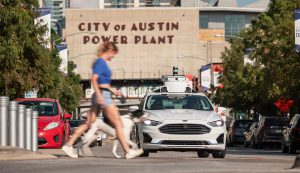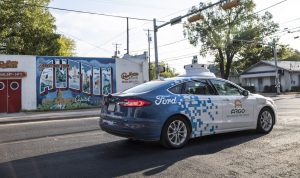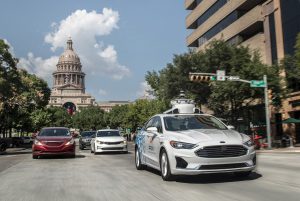
Austin, Texas is the third city that Ford and its mobility partner, Argo AI, will test autonomous vehicles.
Ford continues to expand its autonomous vehicle development program with the addition of third city – Austin, Texas – for its self-driving test fleet of Ford Fusions.
The Michigan-based automaker is already testing vehicles with its partner, Argo AI, in Miami/Dade County and Washington, D.C. The company is also running a small fleet of vehicles in Detroit. Austin provides Ford with a unique test bed: A growing one.
In each of the last eight years, Austin has been the fastest growing metro region in America, according to the U.S. Census Bureau. The Capital Area Metropolitan Planning Organization predicts vehicle use in the Austin region could double by 2040, while highway capacity will only grow 15%.
(Ford Begins Testing Autonomous Vehicles in Detroit)
“At Ford, we think self-driving vehicles have an important role to play in the future of our cities,” Sherif Marakby, CEO, Ford Autonomous Vehicles LLC, wrote in a piece on Medium.com announcing the new partnership with Austin. “As we continue to move towards the commercial launch of our self-driving vehicle services, we are expanding our testing operations in Austin in collaboration with Argo AI.
“This includes working closely with city and state officials and community partners to help ensure we are properly integrating our plans into the wider transportation system. Ford and Austin officials believe self-driving vehicles can be part of a comprehensive mobility solution by providing wider access to transportation and more efficient goods delivery.”
The move to Austin isn’t all that surprising. For all of the publicity other states like California, Nevada, Arizona and others have gotten for allowing testing on public roads, Texas is offering just as many opportunities for autonomous development.
Texas has signaled ambitious plans for self-driving technology, passing a bill governing autonomous technology in the state while creating a Connected and Autonomous Vehicle Task Force to further study self-driving vehicles. Austin continues to be a huge proponent of innovation, becoming the first city in the world to host a driverless vehicle on public streets and forming a Smart Mobility Office that’s focused on quickly piloting new technology, Marakby noted.
(Ford Charges Ahead with New Autonomous Vehicle Unit)
Austin’s stunning growth rate provides Ford and Argo with a unique set of challenges, the diversity of the city also offers a plethora of hurdles. Austin has a vibrant downtown, but’s also home to a major university – the University of Texas – and is home to a number of businesses.
Fortunately, there will be some time for Austinites to get used to the funny cars with giant roof racks buzzing around tow
n. Argo AI will spend the next several months mapping east Austin and the downtown in preparation for the implementation of the autonomous fleet.
“During our mapping process, though, we also get a sneak peek at what challenges may await us,” said Peter Rander, Argo AI founder. “That’s also true in Austin, which features heavy pedestrian activity, notably people riding bicycles and scooters.
“Scooters are especially interesting because they’re essentially motorized pedestrians, with speedy and unique movement behavior that needs to be accounted for. Austin has more scooter activity than we’ve seen in other cities where we’re currently testing.”
(Ford and VW Formally Unveil “Collaboration” on Electric and Autonomous Vehicles)
After that, it will map the rest of the area over time. Its research team will also need learn the traffic laws and customers that are specific to the city. The group will also meet with local politicians, business leaders and other groups to determine the needs these vehicles can fill.


